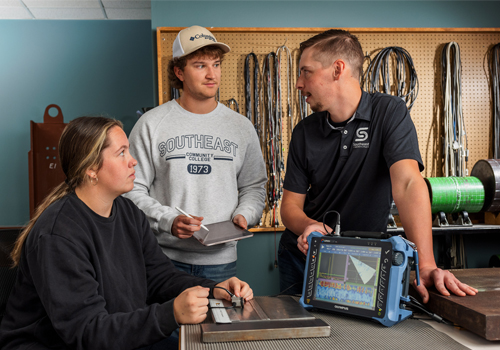The Evolution of Manufacturing at SCC

Look around. Nearly everything you use on a daily basis was created by somebody in the manufacturing industry. Manufacturing is the core industry every other industry relies on to be successful.
“The manufacturing industry makes a huge impact on a daily basis,” said Eric Stieb, co-founder of Zermatt Tool, Inc. “Virtually everything that is either consumed or used is manufactured.”
According to the National Association of Manufacturers, Nebraska ranked No. 14 in the nation in 2023 with 103,508 people employed in the manufacturing industry. Overall, Nebraska had 1,759 manufacturers in operation. The manufacturing industry added $19 billion to Nebraska’s economy comprising 11.5% of its gross domestic product. The agriculture industry makes up 50% of Nebraska’s manufacturing sector while the machinery and fabricated metal product makes up 18%.
Southeast Community College has a long history with the manufacturing industry in Nebraska which began on May 1, 1941. On that date the Nebraska Trade School opened on the Soldiers and Sailors Home campus in Milford when five instructors taught five students in the instructional areas of Auto Mechanics, Auto Electricity, Machine Shop, General Welding and Foundry Pattern Making. When Japan bombed Pearl Harbor on Dec. 7, 1941, the focus of the school shifted immediately to aid in the national defense by adding the programs of Aircraft Sheet Metal, Industrial Electricity, Radio Operating and Mechanical Drafting. During the war, close to 2,000 war production workers and specialized technicians were trained around the clock in Milford under special arrangement with war plants.
On July 1, 1972, the Nebraska Legislature created the technical community college system and SCC opened its doors in 1973. SCC currently teaches the next generation of manufacturers in Electrical & Electromechanical Technology; Electrician Construction, IBEW; Electronic Systems Technology; Energy Generation Operations; Manufacturing Engineering Technology; Nondestructive Testing Technology; Precision Machining & Automation – Advanced CNC & Automation; Precision Machining & Automation – Tool Maker Mold & Die; and Welding Technology.
“Tech education is as important as any college degree,” said Scott Volk, vice president at MetalQuest Unlimited. “Once the general public understands this, the sooner we start to fix our skills gap.”
Zachary Kisby, program director of Nondestructive Testing Technology, sees the industry from a unique standpoint. A graduate of the NDT program at SCC, Kisby worked for four years in the petrochemical industry doing ultrasonics, magnetic particle and penetrant testing. In October 2021 he joined SCC as an instructor before moving into the role as program chair in May of 2023.
Not only does he bring the perspective as an employer working in the field to the classroom, but he also has a different outlook of the manufacturing industry. His industry tests the materials being manufactured and focuses on personal and public safety as well as financial loss. Kisby advises his students to continue learning after they graduate in order to keep on top of industry changes. If you stay stagnant, you will not grow with the industry.
“A student in our program at SCC follows a pathway in order to gain a better understanding of the industry,” Kisby said. “From day one, they are introduced to a new world of terminology and theory of our field of work. While we are not physically manufacturing a product or material, we are seeing that those parts and components are fit for or fit to remain in service.”
Jared Switzer graduated in May of 2024 from the Manufacturing Engineering Technology program ready to start his career as Lead Technical Drafter at Kawasaki. His path after graduating from Sutton High School took him to the Computer Science program at the University of Nebraska–Lincoln. After a year at UNL, he enrolled at SCC on the production side of manufacturing before realizing he wanted to work on the design side. All of these experiences prepared him for his career in manufacturing.
“I really liked the smaller classes at SCC because I got to know my instructors and my peers,” Switzer explained. “They had us working on massive group projects like making an air cannon from start to finish. We did such a diverse set of projects for all of the different classes that we really had a wide range of experiences. I feel I am ready for my career.”
Jennifer Snyder
Communications Specialist
402-323-3393
jsnyder@southeast.edu